
Jean-Paul Riopelle, was a Canadian painter and sculptor from Quebec. He had one of the longest and most important international careers of the sixteen signatories of the Refus Global, the 1948 manifesto that announced the Quebecois artistic community's refusal of clericalism and provincialism. He is best known for his abstract painting style, in particular his "mosaic" works of the 1950s when he famously abandoned the paintbrush, using only a palette knife to apply paint to canvas, giving his works a distinctive sculptural quality. He became the first Canadian painter since James Wilson Morrice to attain widespread international recognition and high praise, both during his career and after his death. He was a leading artist of French Lyrical Abstraction.

The Musée d'Art Moderne et Contemporain de Strasbourg is an art museum in Strasbourg, France, which was founded in 1973 and opened in its own building in November 1998.

Mihael Milunović is a Serbian and French painter. His work encompasses a wide range of artistic disciplines, from painting, drawing and photography through large-scale sculptures, installations, to sound, video and objects. His main interests focus on social and political issues. By decontextualizing everyday objects, symbols or situations, Milunović provokes unease in the observer, a blend of alienation and curiosity.
Claude Viallat is a French contemporary painter.

Jean Rustin was a French painter and prominent figurative artist.
Takako Saito is a Japanese artist closely associated with Fluxus, the international collective of avant-garde artists that was active primarily in the 1960s and 1970s. Saito contributed a number of performances and artworks to the movement, which continue to be exhibited in Fluxus exhibitions to the present day. She was also deeply involved in the production of Fluxus edition works during the height of their production, and worked closely with George Maciunas.
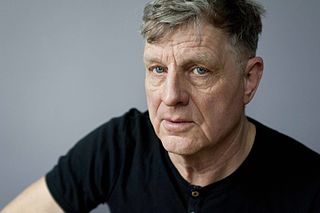
Rainer Fetting is a German painter and sculptor.
Thaddaeus Ropac is an Austrian gallerist specializing in international contemporary art. He founded the Galerie Thaddaeus Ropac in 1981, and represents today more than 60 artists with his galleries in Salzburg (Austria), Paris Le Marais, Paris Pantin and London.
Thea Djordjadze is a contemporary German-Georgian artist based in Berlin, Germany. She is best known for sculpture and installation art, but also works in a variety of other media.
Markus Schinwald is an Austrian visual artist. He lives and works in Vienna, Austria, and New York. Since 2021, Schinwald is professor at the Staatlichen Akademie der Bildenden Künste, Karlsruhe. Previously, he taught phenomenology at Yale University.

Oliver Beer is a British artist who lives and works between London and Paris. He makes sculptures, installations, videos, and immersive live performances.
Claude Garache (1929-2023) is a French artist. He has worked in painting, sculpture, illustration and engraving. His principal subject is the female nude. Much of his work uses a single colour on a monochrome background, very often blood-red on white.
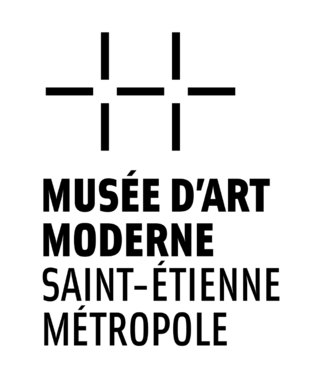
The Musée d'art moderne et contemporain, or MAMC, is an art museum in Saint-Étienne, Auvergne-Rhône-Alpes, France. It was inaugurated as a separate museum in 1987. It has one of the largest collections of its type in France.
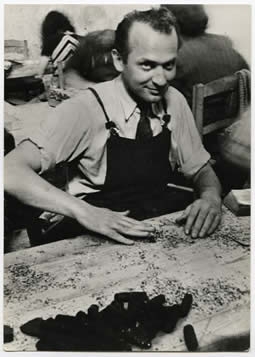
Jacques Hérold was a prominent surrealist painter born in Piatra Neamț, Romania.
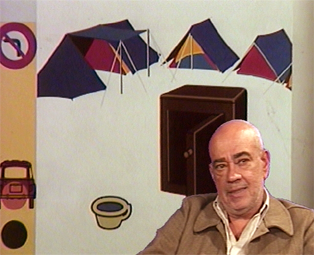
Hervé Télémaque was a French painter of Haitian origin, associated with the surrealism and the narrative figuration movements. He lived and worked in Paris from 1961 on.
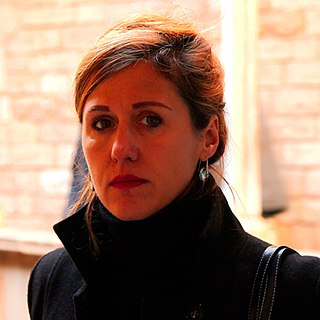
Nina Kovacheva, is a French-Bulgarian artist. She lives and works in France.
Camille Bryen, also known as Camille Briand, was a French poet, painter and engraver.

Vincent Bioulès is a French painter, born on March 5, 1938 in Montpellier, where he lives and works.

Louis Cane was a French painter, sculptor, and furniture designer.

Jean Le Gac is a French conceptual artist, painter, pastelist, photographer using mixed media, frequently video or photography and text to document his investigations and sketched scenes. His poetic photographic interventions in which he is most often the main subject are accompanied either by typed text describing the underlying story in the artwork or handwritten notes in the art piece itself. Member of the Narrative art movement since the seventies, Le Gac ofttimes tells a story about an imaginary character that viewers can easily identify with the artist himself. He calls it a “metaphor for painting." Le Gac also uses the artist's book as a central part of his art practice. Le Gac is a Professor and lecturer at Institut des hautes études en arts plastiques.












